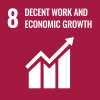The COVID-19 pandemic has caused the most universal health and socio-economic crisis in recent history. However, the magnitude of the economic damage has differed widely; some countries were hit particularly hard, while others have managed to weather the storm much better. In this paper, we use cross-country regression analysis to identify factors that help explain the differences in the growth impact of the COVID-19 shock. Our findings underscore the critical role of balancing health and economic concerns in managing the pandemic as both a country’s exposure to the coronavirus and the stringency of containment measures are strongly correlated with its growth performance. In addition, our results shed light on several aspects of economic resilience. Good governance, provision of fiscal support and strong macroeconomic fundamentals all helped cushion the economic impact. By contrast, a lack of economic diversification – reflected in overreliance on the tourism sector or oil production – has significantly amplified the shock.
The COVID-19 crisis: what explains cross-country differences in the pandemic’s short-term economic impact?
Working Paper Date:
Category: Economic Analysis and Policy
Document Symbol: ST/ESA/2021/DWP/174
JEL Classification: E61, E66, H12, H51, H63, I15, I18, O11, O47
Keywords: COVID-19, growth performance, transmission of shocks, economic resilience
Working Paper File:
wp174_2021.pdf
839.44 KB
 Welcome to the United Nations
Welcome to the United Nations

